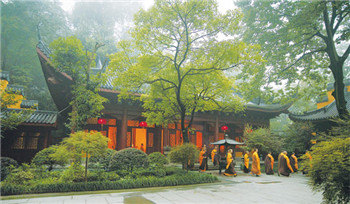(单词翻译:单击)

What makes a genius? Since at least the 19th century, some have said it is down to genetics, while others have argued that upbringing is decisive. More recently, the idea that genius rests on sheer hard work — the “10,000 hours” thesis popularised by the writer Malcolm Gladwell — has gained currency. The latest contribution to the debate comes from the journalist and travel writer Eric Weiner. In The Geography of Genius, he sets out on an epic journey to establish the primacy of place.
天才是怎样炼成的?至少从19世纪开始,一些人便称天才取决于基因,而其他人则认为后天教养才是决定性因素。近来,有关天才纯粹来自辛勤工作的观点——作家马尔科姆格拉德威尔(Malcolm Gladwell)所推广的“10000小时”理论——开始广泛流传。对这场辩论最新的贡献来自记者兼旅行作家艾瑞克传纳(Eric Weiner)。在《寻找天才》(The Geography of Genius)一书中,他踏上了一段史诗般的旅程,来确定人所处的地方对于天才形成的重要作用。
“We hold dear the notion of the solitary creator, courageously overcoming the odds, vanquishing the confederacy of dunces allied against her,” Weiner writes. But a more accurate description, he says, would be that “certain places, at certain times, produced a bumper crop of brilliant minds and good ideas”.
“我们珍视‘孤独的创造者’的概念,她勇敢地克服不利因素,战胜与她对抗的傻瓜联盟,”魏纳写道。但是,他称,更准确的形容是“特定的地方,特定的时间,会产生大量天才和杰出思想”。
In his previous book, The Geography of Bliss (2008), Weiner sought to find the world’s happiest country. Now, he focuses on seven cities to uncover the circumstances that turned them into hubs of cultural, political and technological progress. His quest includes some obvious candidates — the ancient Athens of Socrates and Plato, Leonardo da Vinci’s Florence and today’s Silicon Valley. Added to these are Enlightenment Edinburgh and the Vienna of 1900.
在他之前所著的《寻找快乐之国》(The Geography of Bliss)中,魏纳试图寻找世界上最幸福的国家。如今,他重点关注7座城市来发现使之成为文化、政治和技术进步中心的条件。他所探索的城市包括一些显而易见的候选者——拥有苏格拉底(Socrates)和柏拉图(Plato)的古雅典、达芬奇(Leonardo da Vinci)所在的佛罗伦萨以及今天的硅谷。除此之外还包括启蒙运动时期的爱丁堡和1900年代的维也纳。
Weiner looks beyond the west too. He travels to Hangzhou in China and explores its cultural flourishing during the Song Dynasty. Another chapter takes him to Kolkata, where he focuses on Rabindranath Tagore and the Bengal Renaissance, which lasted from 1840 to 1920. In each city, Weiner speaks with local experts — academics, tour guides, artists — and asks them to précis the elements of their city’s success story.
魏纳的视线还越过了西方。他前往中国杭州,探索了这座城市在宋朝时的文化繁荣。在另一篇章中,他前往加尔各答(Kolkata),重点关注泰戈尔(Rabindranath Tagore)和孟加拉文艺复兴(从1840年到1920年)。在上述两座城市,魏纳与当地专家(学者、导游和艺术家)交流,让他们概述其城市成功故事的要素。
Places of public debate are one common feature that Weiner identifies. The Greeks had their symposia and the Calcuttans organised addas, gatherings where conversation unfolded in a non-linear fashion. The prime example is the Viennese coffeehouse, described by Stefan Zweig as “a sort of democratic club [that] anyone could join... the price of a cheap cup of coffee.” One of the less convincing arguments Weiner makes is that the food of ancient Greece was so bland that it drove Athenians to channel their creative energy into philosophy at dinner.
魏纳发现,这些城市的一个共同特点是拥有公开辩论场所。希腊人有他们的座谈会,加尔各答人会组织发散式谈话的闲聊会。最典型的例子是维也纳人的咖啡馆,斯蒂芬茨威格(Stefan Zweig)将之形容为“任何人都可以加入的一种民主俱乐部……只需要付一杯便宜咖啡的价格。”魏纳所提出的不那么令人信服的观点之一是,古希腊的食物太乏味,以至于雅典人在晚餐时将创造的热情投向了哲学。
Yet Weiner finds differences too, especially between eastern and western conceptions of creativity in relation to history. Chinese and Hindu thinkers, he argues, valued old truths and their rediscovery over innovations. This contrasts with the deeply ingrained western emphasis on novelty.
不过,魏纳也发现了区别,特别是东西方与历史有关的创造力概念。他认为,中国和印度的思想家重视古老的真理以及它们在创新上的再发现。这与西方强调新颖的根深蒂固的观念形成了对比。
Applying DH Lawrence’s insight that all culture is built on a “deep dung of cash”, Weiner discusses the role of money. Most geniuses throughout history have come from the middle and upper-middle classes — those who “had enough money to pursue their passions, but not so much they lapsed into complacency”. Florentine artists thrived thanks to patrons such as the Medicis. Today’s “Medicis of Silicon Valley” are venture capitalists and angel investors. Genius cannot exist in the abstract, argues Weiner — it needs societal recognition and support.
借用劳伦斯(DH Lawrence)观点——所有文化都“深深扎在金钱的粪堆里”,魏纳讨论了金钱的作用。纵观历史长河,多数天才都来自中产阶级或中上层阶级——他们“拥有足够的金钱来追求他们的信念,但是又没有富到可以陷入自满”。多亏了美第奇家族(Medicis)这类资助者的资助,过去佛罗伦萨的艺术家层出不穷。如今“硅谷的美第奇”正是那些风险资本家和天使投资人。魏纳认为,天才不能存在于抽象之中,而需要社会的认可和支持。
Systems of mentorship are important. In Florence, Weiner explores the workshop of the artist Verrocchio, where Leonardo da Vinci was an apprentice and contributed small figures to his master’s paintings. In Silicon Valley, we learn how Mark Zuckerberg asked the advice of veteran investor Roger McNamee when he ran into trouble in the early days of Facebook.
导师体系也很重要。魏纳在佛罗伦萨探索了艺术家韦罗基奥(Verrocchio)的工作室,达芬奇曾是那里的学徒并且参与了导师的少数绘画作品。在硅谷,我们知道,马克丠克伯格(Mark Zuckerberg)在Facebook早期遇到困难时曾请教了老牌投资人罗杰麦克纳米(Roger McNamee)。
Weiner is skilled at weaving together reportage and academic research. If some of his discoveries seem obvious, he also delivers the occasional counterintuitive insight and is a likeable companion. “It’s an unusual sensation, one that, like most unusual sensations, I first mistake for indigestion,” he observes at one point. Not all the thoughts in this romp through history convince, but the journey is always stimulating.
魏纳擅长于将报告文学和学术研究穿插在一起。如果说他的部分发现看起来是显而易见的,他还表现出了偶尔违反直觉的洞察力,同时是个讨人喜欢的朋友。“这是种不同寻常的感觉,就像多数不同寻常的感觉一样,我最初把这种感觉错认为理解障碍,”他一度观察道。并非所有他在历史中徜徉时产生的想法都令人信服,但是这种旅行总是令人兴奋的。


